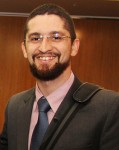The Internet, Education, and Power
It is no news that the Internet has become an indispensable tool in our daily routine. When we access it, those barriers that were previously insurmountable for the majority of citizens come down. However, I have warned that education is power, and this is also true with regard to the proper use of the cyber space. Without the proper teaching, allied with Ecumenical Spirituality, the handling of this influential resource can be disastrous.

Lilian Castelani
A few months ago, Lilian Castelani, a specialist in Computer and Labor Procedure Law from São Paulo, Brazil, made a comment that is of ongoing interest to families: “The main danger in the virtual world is overexposure. People are not ready to use the Internet. They have to be more responsible with regard to what they are going to publish, especially on social media, in which we express ideas and expose our relatives and our image. It’s important to adapt what should in fact be shared, because once posted on the Internet it’s there for the world to see. Information spreads very quickly and today it’s very valuable.”
Castelani recommends that, “Whether on social media or when you go on the Internet to buy any service, you need to evaluate whether the site is trustworthy and if the terms of use are in accordance with what you think is right. Taking these small precautions is essential for safeguarding your privacy well. If not, you will become the victim of some illegality and it will be your own fault.”
The lawyer also emphasized the need for respect for others: “It’s very important to know whether what you’re putting on the Internet is going to upset someone, and if it’s really going to be useful for someone or even for yourself.”
Pay attention now, young people, to what Castelani says: “Sometimes people post intimate photos and don’t realize the repercussion this has on the Internet. With just one click, this spreads to millions of people, and to how many others from then on is immeasurable. Moreover, taking them off the Internet is very difficult! We can take illegal material off the air, but things that you yourself post it’s complicated, and then you’re exposed to cyberbullying and humiliation. You need to be careful even when expressing very controversial opinions. So you have to be cautious when you start putting yourself out on the Internet.”


Daniel Guimarães
Sociologist Daniel Guimarães, from the Sociedade Solidária [Solidary Society] program on Boa Vontade TV, drew this scenario for Castelani: “Children and teenagers are keen users of these technologies. They commonly have better mastery of them than their own parents and generally they aren’t mature enough to understand the limits.”
The advice of the specialist in Computer Law is that, “parents should be alert to their child’s routine. For example, don’t leave the computer that is most frequently used in a closed environment; leave it somewhere where there is greater movement of people. Okay, it’s difficult; today there are smartphones and tablets. But the parents’ attention has to be always greater; observe the child’s behavior and talk to them. I think that prohibiting them is taking the child out of today’s society, because they are included in this social environment in the virtual world. So, engaging in friendly conversations can bring parents and children closer together. It is necessary to understand that sometimes an act by the child can create a criminal liability for the parents, because they are responsible for the child. The parents can’t just arrive home tired and go to sleep. No! Find out how your child’s day was and see whether they’re upset about something, or not. I think that having this conversation in the family is what leads to greater responsibility.”
For Castelani, “the watchword is education.” This is the way to prevent crimes, which according to her, “are out there. They’re the same as they always were; it’s just the means that have altered. Today we have a digital tool that discloses crime much more than before. Educating yourself in how to use the Internet is the great security. Giving yourself privacy and being careful about what you expose are the most coherent measures for getting through in this world.”
Thank you, Lilian Castelani, for this socially very useful clarification.
The comments do not represent the views of this site and are the sole responsibility of their authors. It denied the inclusion of inappropriate materials that violate the moral, good customs, and/or the rights of others. Learn more at Frequently asked questions.